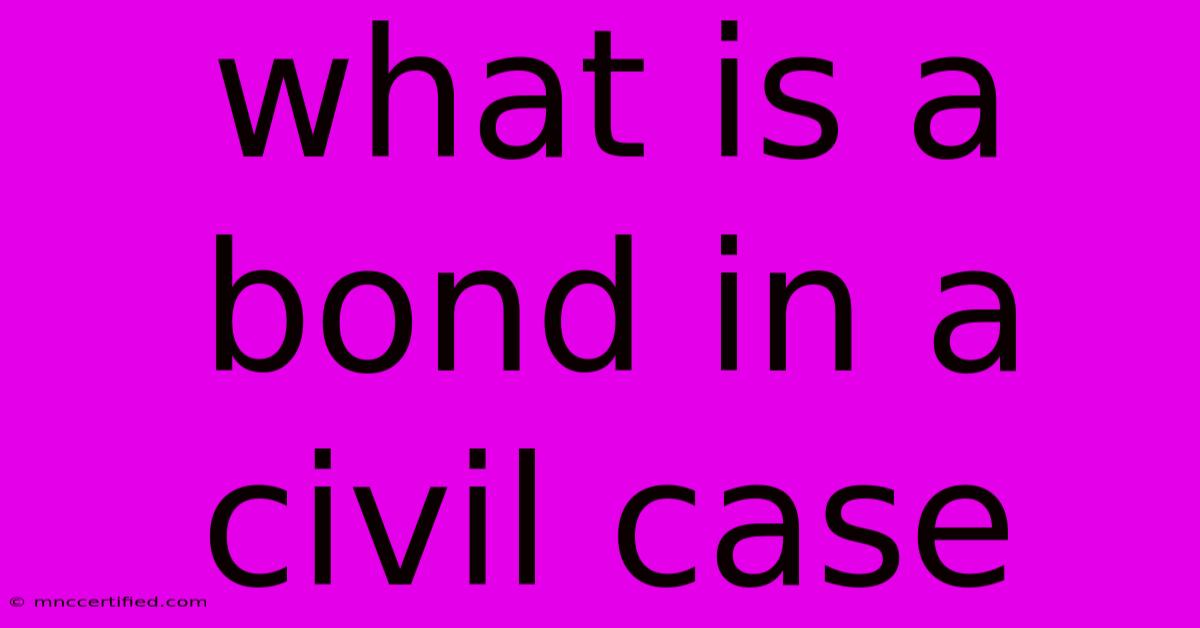What Is A Bond In A Civil Case

Table of Contents
What is a Bond in a Civil Case? Understanding Security and Liability
In the realm of civil litigation, a bond serves as a crucial financial instrument providing a crucial layer of security and ensuring accountability for involved parties. Understanding its purpose and function is vital for anyone navigating the complexities of civil lawsuits. This comprehensive guide explains what a bond is in a civil case, exploring its various types and applications.
What is a Civil Case Bond?
A civil case bond, essentially a type of surety bond, is a financial guarantee issued by a surety company (also known as a bonding company). It assures the court and opposing party that the individual or entity posting the bond will fulfill their obligations as dictated by court orders. This financial guarantee protects the other party against potential losses stemming from the bonded party's failure to comply. The bond essentially acts as insurance, providing compensation if a specific obligation isn't met.
Think of it like this: a bond provides financial security to ensure a party's actions or inaction doesn't harm the other party involved. It's a mechanism to mitigate risk and encourage responsible conduct within the legal proceedings.
Key Players Involved:
- Principal: The individual or entity required to post the bond. This is the party whose actions are being secured.
- Obligee: The party receiving the protection of the bond. This is typically the opposing party in the lawsuit.
- Surety: The bonding company issuing the bond, guaranteeing the principal's performance.
Types of Bonds in Civil Cases
Different types of bonds are used in civil cases, depending on the specific circumstances and requirements. Common examples include:
1. Appeal Bond:
This bond is required when a party appeals a court decision. It guarantees the payment of court costs and potential damages if the appeal is unsuccessful. The appeal bond protects the appellee (the party who won the lower court case) from potential financial losses if the appellant (the party appealing) cannot cover those costs. Keywords: Appeal Bond, surety bond, appeal, court costs, damages, appellant, appellee.
2. Injunction Bond:
An injunction bond is posted to secure an injunction, a court order compelling a party to perform or refrain from performing a specific action. The bond protects the party against whom the injunction is issued in case the injunction is later deemed improper or unwarranted. This bond safeguards against potential damages or losses incurred due to the injunction. Keywords: Injunction Bond, injunction, court order, damages, protection, surety.
3. Attachment Bond:
An attachment bond is required to seize assets belonging to a defendant before a judgment is rendered. It protects the defendant against wrongful seizure of their property if the plaintiff's claim is ultimately unsuccessful. This ensures that the defendant is compensated for any losses incurred due to the improper attachment. Keywords: Attachment Bond, attachment, assets, defendant, plaintiff, wrongful seizure, compensation.
4. Replevin Bond:
A replevin bond allows a party to recover possession of property that has been wrongfully taken. The bond protects the party from whom the property was taken, ensuring compensation if the party seeking replevin is ultimately unsuccessful in their claim. Keywords: Replevin Bond, replevin, property, wrongful taking, possession, compensation, surety bond.
Why are Bonds Necessary in Civil Cases?
Bonds are essential in civil cases because they:
- Protect the Opposing Party: They provide financial security to the opposing party against potential losses or damages.
- Encourage Compliance: They incentivize the posting party to comply with court orders and judgments.
- Ensure Accountability: They hold the posting party accountable for their actions or inaction within the legal proceedings.
- Reduce Risk: They mitigate risk for both the court and the opposing party.
Finding a Surety Bond
Locating a reputable surety company is crucial. Research is key. Look for companies with a strong track record and positive customer reviews. Compare pricing and coverage options to find the best fit for your needs. Remember to carefully review the terms and conditions of any bond before signing.
Understanding the role of bonds in civil cases is vital for both parties involved. This knowledge empowers individuals and businesses to navigate legal proceedings effectively and protect their interests. The information provided here should help, but consulting with a legal professional is recommended for specific advice on your individual situation.

Thank you for visiting our website wich cover about What Is A Bond In A Civil Case. We hope the information provided has been useful to you. Feel free to contact us if you have any questions or need further assistance. See you next time and dont miss to bookmark.
Featured Posts
-
Breast Lift Back Pain Insurance
Nov 26, 2024
-
Bruce Greenwald Value Investing
Nov 26, 2024
-
Community Investment Tax Credit
Nov 26, 2024
-
Police Investigating Flood Wave Caused By Tractor
Nov 26, 2024
-
Search For Missing Mauis Hannah Kobayashi
Nov 26, 2024